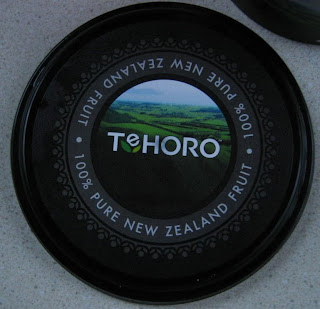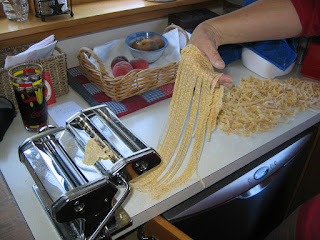I purchased my first ever Pomegranate just before Christmas, then got busy with all the festivities and it sat in the fridge, getting some brown spots on the skin and wondering if I was ever going to do anything with it...So finally yesterday, I sliced it in half, actually thinking it would be rotten, but no !!! it was majestic..glistening, jewel like little rubys inside !! I was excited..so I whacked out a couple of seeds and crunched on them..the juice spurted out, I wasn't expecting that, had no idea what to expect really. So I held one of the halves cupped in my hand and squeezed it hard over the bowl..and masses of juice came out !!
.....enough for 3/4's of a glass of juice in fact. I tentativeley touched it to my lips..... half expecting it to taste like raspberry, because of the deep red colour...but no..it was sweet, slightly astringent..a tad tart as well..and all in all, its own unusual lovely self..mmm
I loved everything about it, and was excited to think of ways to use the lovely red seeds in all sorts of decorative ways in future, dessert..salads..and who knows what else...
When refrigerated in a plastic bag, pomegranates will keep for up to 2 months
Heres'a little history on the Pomegranate for other foodies like me. It actually has quite a spiritual history
Miss Pomegranates History
In the Greek myth of Persephone, the pomegranate is called the fruit of the underworld, yet in the Muslim Qu'uran it is called the fruit of paradise.
The inner beauty of the pomegranate has inspired design since Biblical times, and there are some who believe it may be the fruit on the tree of life.
As befits a fruit with many seeds, the pomegranate is the traditional representation of fertility, and seems to have its origins everywhere. We see it in the Middle East and India. The pomegranate was cultivated in Egypt before the time of Moses.
The pomegranate is significant in Jewish custom. Tradition holds that a pomegranate has 613 seeds to represent the 613 commandments in the Torah. The design of the pomegranate was woven into the high priest's robes, and brass representations were part of the Temple's pillars. It is mentioned six times in the Song of Solomon.We see the pomegranate again in ancient Greece and Rome. In the verses of the Odyssey, Homer mentions it as part of the gardens of Alcinous (probably in Sicily). The Romans imported their pomegranates from African Libya, and Pliny the Elder gave instructions for its storage. Lest the pomegranate be neglected in the East, it appears in China during the Han and Sung dynasties.The derivation of the word pomegranate comes from the Middle French pome garnete (seeded apple), but Europeans were slow to adopt the pomegranate.
Health Benefits of Pomegranate
The pomegranate has been used in folk medicine for centuries in the Middle East, India, and Iran. The health giving properties of the pomegranate are celebrated in a Jewish fairy tale, and it takes its place in Indian Ayurvedic medicine. The pomegranate provides a substantial amount of potassium, is high in fiber, and contains vitamin C and niacin.
Preliminary studies indicate that the juice may possess almost three times the total antioxidant ability of green tea or red wine.
Biblical References to Pomegranate - Is This the Tree of Life?
Some scholars believe that the apple was used by early artists to depict the scene of Adam and Eve in the Garden of Eden because it was easy to draw, but some feel that the pomegranate is the true fruit of the tree of life. Consider these Biblical quotations:
Haggai 2:19 Is the seed still in the barn? Even including the vine, the fig tree, the pomegranate and the olive tree, it has not borne {fruit.} Yet from this day on I will bless {you.}
Song of Solomon 4 :13 Your shoots are an orchard of pomegranates with choice fruits, henna with nard plants. . .
Song of Solomon 8 :2 I would lead you {and} bring you Into the house of my mother, who used to instruct me; I would give you spiced wine to drink from the juice of my pomegranates.
Deuteronomy 8:8 A land of wheat and barley, of vines and fig trees and pomegranates, a land of olive oil and honey; . . .
Numbers 20:5 Why have you made us come up from Egypt, to bring us in to this wretched place? It is not a place of grain or figs or vines or pomegranates, nor is there water to drink.
1 Samuel 14:2 Saul was staying in the outskirts of Gibeah under the pomegranate tree which is in Migron. And the people who {were} with him {were} about six hundred men.
Exodus 39:24 They made pomegranates of blue and purple and scarlet {material and} twisted {linen} on the hem of the robe. They also made bells of pure gold, and put the bells between the pomegranates all around on the hem of the robe, alternating a bell and a pomegranate all around on the hem of the robe for the service, just as the LORD had commanded Moses.
Numbers 13 :23 Then they came to the valley of Eshcol and from there cut down a branch with a single cluster of grapes; and they carried it on a pole between two {men,} with some of the pomegranates and the figs
The last word on pomegranates belongs, as did the first, to William Shakespeare:
Wilt thou be gone? it is not yet near day.
It was the nightingale, and not the lark,
That pierced the fearful hollow of thine ear.
Nightly she sings on yon pomegranate-tree.
Believe me, love, it was the nightingale.
(Romeo and Juliet, III, 5)
Most of my info was aquired via
http://www.inmamaskitchen.com/FOOD_IS_ART_II/food_history_and_facts/pomegranate_article.html















































